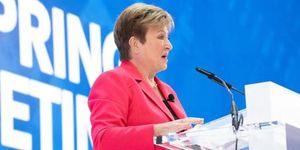In a tense climate of international diplomacy, the ongoing conflict between Russia and Ukraine continues to escalate, drawing attention to the complexities of peace negotiations. On April 23, 2025, a significant diplomatic meeting was held in London, aimed at addressing the urgent need for a ceasefire and potential resolution to the war. However, the talks have been marred by the absence of key figures and a lack of high-level engagement, raising concerns about the feasibility of any agreements.
Initially, a meeting of foreign ministers was anticipated as part of the Ukraine peace discussions, but it was postponed, leading to a downgraded format of negotiations among advisors instead. The UK Foreign Office confirmed that US Secretary of State Marco Rubio would not attend, citing scheduling conflicts, while British Foreign Secretary David Lammy opted for bilateral meetings with Ukrainian representatives instead. This shift in dynamics has left many observers questioning the seriousness of the peace efforts.
US Vice President J.D. Vance has reiterated the administration's stance, emphasizing the urgency for both Russia and Ukraine to agree on a peace deal. "We have presented a clear proposal to both the Russians and the Ukrainians, and it is time for them to either say yes or for the United States to withdraw from the process," Vance stated during a press conference in India. His comments reflect a growing impatience within the US government regarding the lack of progress in the negotiations.
Meanwhile, former President Donald Trump has publicly criticized Ukrainian President Volodymyr Zelenskyy for his refusal to acknowledge Russia's annexation of Crimea, arguing that such a stance prolongs the conflict. On his platform Truth Social, Trump remarked, "If he wants Crimea, why didn’t they fight for it eleven years ago when it was handed over to Russia without a shot?" Trump's remarks have stirred controversy, as they underscore the contentious nature of the negotiations and the differing perspectives on territorial integrity.
In a related development, Zelenskyy has firmly stated that Ukraine will not recognize the annexation of Crimea or any other occupied territories, declaring, "There is nothing to discuss. This is outside our constitution." His steadfast position has been echoed by Ukrainian officials, who insist that any peace talks must prioritize the country's territorial integrity.
As discussions unfolded in London, the backdrop of violence continued to loom over the negotiations. Reports emerged of a devastating Russian drone attack in the central Ukrainian city of Marhanez, which resulted in the deaths of at least nine individuals and left 49 others injured. The attack targeted a bus carrying employees, highlighting the ongoing threat to civilian life amidst the conflict. Similar assaults have been reported in other regions, including Poltawa and Odessa, where civilian infrastructure has been severely impacted.
In response to the violence, the Ukrainian Foreign Ministry summoned China's ambassador to address allegations of Beijing's involvement in the conflict. Zelenskyy accused China of supplying weapons to Russia, stating, "We have finally received information that China is providing weapons to the Russian Federation." This accusation adds another layer of complexity to the geopolitical landscape surrounding the war, as Ukraine seeks to garner international support against Russian aggression.
The international community's involvement in the peace process has also faced scrutiny. EU foreign policy chief Kaja Kallas criticized the US for not utilizing all available tools to exert pressure on Russia and facilitate a ceasefire. She expressed concern that the US might abandon its role in the negotiations, emphasizing the need for a unified approach to achieve lasting peace.
As the conflict continues, the stakes remain high for all parties involved. The potential fallout from a failed peace process could have dire consequences not only for Ukraine but also for neighboring countries like Germany, who fear the repercussions of a prolonged war. Trump's proposed peace plan, which has been met with skepticism, could ultimately benefit only Russia if it fails to address Ukraine's sovereignty and territorial claims.
On the ground, the humanitarian toll of the conflict is becoming increasingly severe. The Ukrainian government has reported a rising number of casualties and injuries due to ongoing military operations. As the situation deteriorates, the urgency for a ceasefire grows more pressing, with Zelenskyy reiterating his commitment to seeking a "full and unconditional ceasefire" as a precursor to any peace negotiations.
Despite the challenges, Zelenskyy remains hopeful about the future of peace talks, stating, "We are ready for discussions with Russia in any form, as soon as a ceasefire is in effect." The upcoming meetings in London and the involvement of key international players will be crucial in determining the path forward for Ukraine and its allies.
As the world watches closely, the question remains: can a viable peace agreement be reached, or will the conflict continue to escalate, further complicating an already fraught geopolitical landscape? The answer may lie in the willingness of all parties to compromise and prioritize the cessation of hostilities over territorial ambitions.




